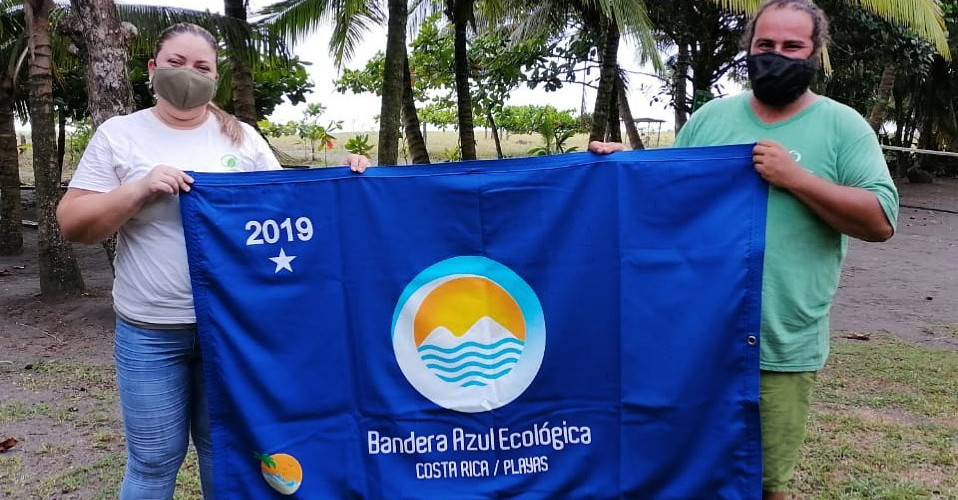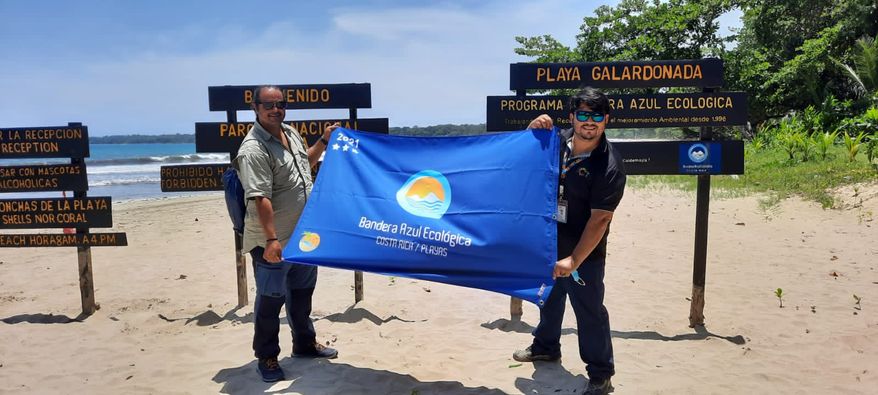On the Caribbean coast of Costa Rica, an ecosystem thrives under the stewardship of Pacuare Reserve and Ecology Project International (EPI). In addition to safeguarding one of the most important nesting sites for endangered leatherback sea turtles in the world, Pacuare Reserve is an international research and education hub for youth, teachers, ecotourists, and scientists interested in wildlife conservation and habitat restoration. Beyond facilitating access to wildlife research and education, Pacuare Reserve staff members set an example of living sustainably with their participation in Costa Rica’s Blue Flag Ecology Program.
Pacuare Reserve staff members proudly display flags from 2017, 2019, 2021, and 2022.
About Costa Rica’s Blue Flag Ecology Program
The Blue Flag Ecology Program, locally known as el Programa Bandera Azul Ecológica, is a collaborative effort between multiple Costa Rican agencies, including the Costa Rican Tourism Institute and the Ministry of Environment, that recognizes participating entities for outstanding efforts in sustainability and conservation. With 10 different program categories to choose from, such as Communities, Sustainable Homes, and Protected Natural Spaces, the Beach Category is the oldest and most well-known. For a beach to earn the distinction of a Blue Flag, meticulous data collecting, reporting, and presenting on the beach’s sustainability status is required.
The program includes a white star-ranking system that gets more specific into participants’ conservation efforts. While earning one out of five white stars may not sound like a big accomplishment, one white star represents scoring an impressive 90% on the program’s rigorous evaluation scale. Five white stars represent a perfect evaluation.
Participants in the Beach Category are scored under six parameters: coastal health quality (40% of score), seawater quality (20% of score), environmental education (20% of score), drinking water quality (10% of score), safety (5% of score), and administration 5% of score).

Pacuare Reserve received a perfect score in the environmental education section of the 2023 evaluation.
Pacuare Reserve’s Commitment to Conservation
“Costa Rica is famous for its beaches, which are visited many times throughout the year. The negative environmental impact people can have by producing garbage and pollution on the beach, ending up in the sea, is huge. To face that problem, the beach category is super important,” said Esteban Lobo Pérez, Pacuare Reserve’s Community Outreach and Reservations Coordinator. Esteban also coordinates Pacuare Reserve’s Blue Flag committee, a group of staff members who work tremendously hard to earn the Blue Flag distinction.
If different categories, point systems, flags, and white stars weren’t confusing enough, there is more! Participants can also earn different colored stars, representing six additional conservation subcategories. Thanks to Pacuare Reserve’s participation in the “Stop Animal Selfies” campaign, they earned their first Orange Star for raising awareness of animal welfare issues! They also earned a pink star, representing the Reserve’s dedication to visitor safety.
Pacuare Reserve staff’s outstanding efforts resulted in a Blue Flag with two white stars for their work in 2023, representing roughly 95% of program perfection! The Reserve has been honored with at least one white star for eight consecutive years. As a beacon of sustainability in Costa Rica, the Reserve sets a global example of conservation success. By sharing best practices and fostering collaboration, Pacuare Reserve contributes to a broader movement for environmental conservation and sustainable development.
“The Reserve may be remote, but it operates like a small community, and we want to find more sustainable ways of living during the time we live together in nature, which is not something we can do alone. Any trace visitors leave is really important. They help a lot with research and conservation, but can also leave an impact if we don’t provide resources and education,” said Esteban.
2023 Bandera Azul Ecológica award ceremony on March 22, 2024.
Celebrating the Achievements and Looking Ahead
Congratulations to the incredible team who helped with the reporting, monitoring, and presenting that earned Pacuare Reserve a Blue Flag, one orange star, one pink star, and two white stars! Hard work is underway to ensure another win for 2024 and we can't wait to see what the team achieves moving forward.















